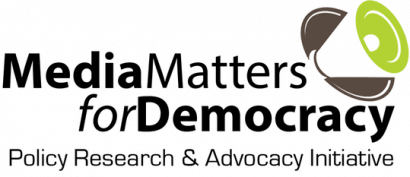‘Media and Information Literacy’ Crucial for Peace and Tolerance
National Conference on Media and Information Literacy for Prevention of Violent Extremism kicks off in Federal Capital
(Islamabad, 17 Sept) Speakers stressed the need to equip Pakistani citizens with media and information literacy skills in order to eliminate violent extremism and hate speech from society.
They were speaking at a national conference on Media and Information Literacy for Prevention of Violent Extremism in Islamabad on Tuesday.
The two-day multi-stakeholder dialogue was organised by the UNESCO Information for All Programme in collaboration with the UNESCO Information for All Programme (IFAP) National Committee and civil society partner Media Matters for Democracy.
Chief guest Shafqat Mahmood, Minister for Federal Education and Training, delivered the keynote address at the conference.
Mr. Mahmood said the public education system must prepare Pakistani youth and children for effective and ethical engagement with digital media and new information technologies.
He mentioned media and information literacy can develop critical thinking skills and respect for cultural diversity among young Pakistanis. The minister also said the federal government was working on education reforms and a unified curriculum for the country that would meet international standards.
Earlier, UNESCO Representative for Pakistan, Ms. Vibeke Jensen welcomed the guests at the event. Ms. Jensen informed the participants about UNESCO’s vision for using media and information literacy as a tool to promote intercultural dialogue and counter online disinformation. She mentioned, “Media and Information Literacy for Prevention of Violent Extremism is highly relevant for Pakistan, a country that as well all know has faced problems in terms of terrorism and violent extremism, but also has made commendable progress in addressing this challenge. But unfortunately, Pakistan, as well as the rest of the world, will constantly need to stay abreast of these rapidly evolving issues and keep equipping ourselves to tackle on going issues as well as mitigate upcoming challenges.”
Professor Dr. Akram Shaikh, the Chair of the UNESCO Information for All Programme National Committee, introduced the conference objectives to the participants. Mr. Shaikh said the conference intends to be a stepping stone for developing policies and launching initiatives related to media and information literacy in Pakistan.
Titled “Ba-shaoor Shehri, PurAmn Pakistan”, the conference engaged participants in panel discussions, training workshops, and roundtable consultations on the first day to discuss strategies for adapting media and information literacy skills in the local context.
During the opening plenary, speakers presented an overview of Pakistan’s efforts to prevent violent extremism and suggested that development approaches to counter extremism are necessary alongside security-based interventions. The speakers suggested the effective use of mainstream and digital media to spread a counter-narrative of peace and tolerance. They said media and information literacy can build resilience among Pakistani citizens to messages of hate.
In another session, experts discussed issues related to youth radicalisation in the country and identified the misuse of online spaces by violent extremists to stoke hatred and discrimination on the basis of identity. The participants proposed that youth empowerment programmes focussing on global citizenship, respect for human rights, and critical thinking are necessary to reduce vulnerability to online radicalisation. In another panel discussion, the effects of violent extremist thoughts and behaviour on gender were discussed.
The conference was attended by government officials, civil society representatives, members of the academia, and media professionals from across the country. The event will conclude on Wednesday with action plans and strategies to integrate media and information literacy in efforts to prevent violent extremism in Pakistan.
Media and Information Literacy, a composite concept developed by UNESCO, consists of skills that allow citizens to articulate their information needs, seek access to credible information sources, critically evaluate media messages, and produce ethical news and information themselves.
